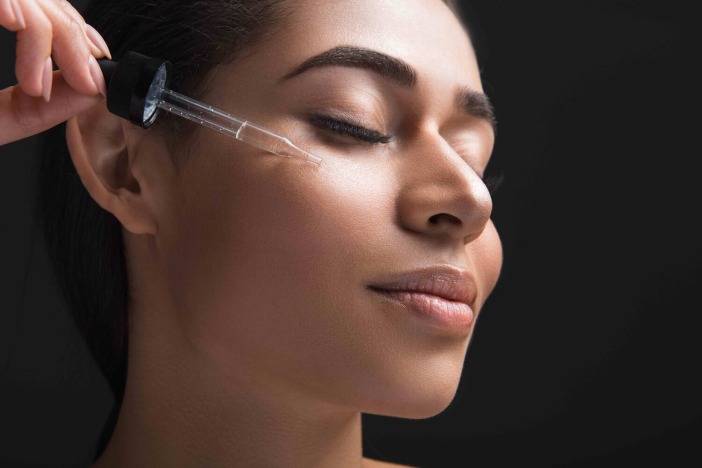Rosehip oil is not as commonly mentioned as the likes of the frequently hailed jojoba oil, coconut oil, virgin olive oil, sweet almond oil, and other natural oils. You should know that rosehip oil is just as potent as the others and is safe for your face.
Face oils have gained good ground in the world of skincare. Myths have been debunked, and it may be rather odd if you do not have a bottle of oil in your regimen. These oils have found so many cosmetic and healing purposes.
And rosehip oil is not left out of this. This oil is packed with a lot of nutrients that your face certainly needs now.
This post details the many things rosehip oil can do for your face and a list of ways to tap into these benefits.
What is rosehip oil?
Rosehip oil is not to be mistaken for rose essential oil. Rosehip oil is a carrier oil gotten from the seeds and fruits of wild rose plants like Rosa canina or Rosa moschata.
This oil is a carrier oil concentrated with essential fatty acids like linoleic acid, linolenic acid, oleic acid, and palmitic acid. Also, it contains antioxidants like vitamins A & E, which help to protect your skin.
In addition, this carrier oil is non-comedogenic; therefore, it is least likely to clog your pores. It is a lightweight oil that quickly absorbs into your skin without leaving residue. For this reason, it falls in the category of oils referred to as dry oils.
Moreover, rosehip oil has anti-inflammatory, antibacterial, antifungal, and antimicrobial properties, which makes it great for soothing, protecting, and healing your skin.
Rosehip oil is great for diluting essential oils like tea tree essential oil, peppermint essential oil, and lavender essential oil.
Can you use rosehip oil on your face?
Rosehip oil is completely safe for facial skincare.
Rather than causing breakouts, rosehip oil helps to prevent breakouts. It has a high concentration of linoleic acid, a fatty acid known to reduce sebum production.
Besides, this non-comedogenic carrier oil is safe for every skin type. Oily and acne-prone skin benefits richly from its sebum regulation property, which helps to tame blackheads and whiteheads.
Like every oil, rosehip oil is moisturizing and helps to keep hydration levels steady. It keeps dryness and itching at bay. Its anti-inflammatory property makes rosehip oil exceptionally good for people with sensitive skin.
What does rosehip oil do for your face?
Good for moisture
Rosehip oil casts a protective layer over your skin that prevents transepidermal water loss, which can lead to dehydration. Also, it contains vitamin E, a humectant that draws moisture from the environment and traps in it the deep layers of your skin.
Vitamin E and linoleic acid work together to retain moisture. Consequently, steady moisture levels keep sebum production in check and prevent dehydration.
Helps to tame acne
Rosehip oil mimics skin sebum and regulates oil production. Moreover, the linoleic acid content makes up for the deficiency that makes your skin acne-prone.
The antioxidants present in rosehip oil help fight off the formation of free radicals caused by exposure to environmental irritants that can cause acne breakouts.
In addition, rosehip oil uses its anti-inflammatory properties to reduce inflammation that can result in acne.
Improves your complexion
Vitamin C, a skin-brightening vitamin, is one of the antioxidants present in rosehip oil. It tightens your pores, and this affects the overall texture and appearance of your skin.
More so, it evens your skin tone and fades discolorations due to hyperpigmentation. This skin tone improvement leaves you with luminous skin upon application on your face.
Treats aging
The formation of free radicals can trigger the development of fine lines and facial wrinkles. Topical application of rosehip oil can halt premature aging in its steps. Antioxidants like vitamins A, C, and E help to fight off the formation of these free radicals.
Vitamins A and C stimulate the synthesis of collagen, a protein necessary for skin cell renewal. Therefore, rosehip oil can enhance cell turnover and improve the appearance of fine lines and wrinkles.
Promotes skin renewal
Rosehip oil is rich in essential fatty acids and antioxidants that can trigger tissue regeneration and skin cell renewal. Also, it helps to firm sagging skin and rejuvenate your skin back to its youthful glory.
Mild exfoliator
Rosehip oil is a natural skin exfoliator that does not put pressure on your skin and cause it to dry out. It uses its antioxidants to increase cell turnover and reveal brighter, smoother, and softer skin.
Unlike other exfoliators, it doubles as a moisturizer, keeps moisture from leaving your skin, and draws moisture from the environment to your skin.
Boosts skin cell immunity
Linoleic acid and linolenic acid are essential fatty acids present in rosehip oil. These fatty acids improve the skin’s natural lipid barrier.
Consequently, a functioning barrier protects your skin from infections and irritants that can cause your skin to break out with acne.
Soothes your skin
Vitamin E is a strong antioxidant that confers an anti-inflammatory effect on the skin. It soothes eczema, rosacea, and redness. This makes rosehip oil a good pick for people with sensitive skin.
Wound healing
Rosehip oil uses its moisturizing property and vitamins present to regenerate tissues and heal wounds. Moreover, it keeps wounds, like cuts from shaving, from drying out and leaving you with scars.
Can you use rosehip oil for oil cleansing?
Yes, you can.
The process of oil cleansing works better with lightweight non-comedogenic oils. And rosehip oil fits into this description.
This natural oil is worth ditching your facial cleanser for. It penetrates deep into your pores, dissolves excess sebum, and lifts clogs and the bacteria responsible for acne.
In essence, rosehip oil is exceptionally good for oily and acne-prone skin types (the skin types that need to clean off excess oil).
Can you use rosehip oil as a moisturizer?
Rosehip oil is a moisturizing oil.
It contains fatty acids that improve your natural barrier and retain moisture. The fatty acids, in tandem with vitamin E, use their emollient properties to keep your skin hydrated and supple.
On some days, you may use rosehip oil to moisturize your face without a moisturizer. But this does not make it better than face moisturizers. Rosehip oil lacks ingredients like water and sufficient emollients.
However, it may suffice if you are in a pinch, and it is a great option if you’ll like to mix your moisturizer with oil.
Can you use rosehip oil for gua sha?
The benefits of using rosehip oil support the purposes of gua sha.
Therefore, it is a good choice for face massage. It is lightweight and will aid the smooth and easy gliding of your gua sha tool.
While gliding the tool over your face, the nutrients in rosehip oil seep into your skin and stimulate blood circulation, promoting healing, fading of scars, and improvement of fine lines and wrinkles.
In addition, rosehip supports the therapeutic benefit of a gua sha. It calms your facial nerves and soothes inflammation.
Can you use rosehip oil around your eyes?
Yes, you can.
Rosehip oil is moisturizing and potent for treating aging. More so, the skin around the eyes is the thinnest skin on the body, and this carrier oil caters to it with its gentle touch.
The moisturizing property of this oil helps to hydrate dark circles and stimulate blood flow around your eyes. Within weeks of application, the dark patches improve, and you have brighter eyes.
Also, rosehip oil stimulates collagen synthesis around your eyes and improves the appearance of fine lines.
How to use rosehip oil for your face

For oil cleansing
To oil cleanse your face with rosehip oil, you need to mix it with castor oil. Castor oil is a strong astringent that helps to lift oil.
- Take equal parts of rosehip oil and castor oil in your palm
- Apply the oil all over your face until it is evenly distributed
- Then, gently rub the oil into your skin to dissolve excess sebum, loosen makeup residue and dead skin cells
- Thereafter, dampen a clean washcloth with warm water and gently use it to wipe across your face
- Wipe until you have cleaned off the oil
- If you feel the need to, you may double cleanse with a mild facial cleanser
- Afterward, moisturize your face appropriately
For undereye serum
Rosehip oil undereye serum is potent for lightening dark patches and smoothening fine lines. Follow this recipe to make your serum.
Materials: 1 tbsp rosehip oil, 1 tbsp jojoba oil, 4-6 drops of vitamin E oil, 4-6 drops of evening primrose extract
How to:
- Mix all the oils in a microwave-safe bowl and heat it in a microwave or a bowl of hot water for 30 seconds. You need the heat to dissolve vitamin E oil
- Afterward, transfer the oil serum into a glass bottle with a dropper applicator
- Then, cleanse your face of oil, dirt, and makeup residue. Remove every eye makeup until you have a clean skin
- Dry your face with a clean towel
- Pump out the oil serum and apply a few drops to your undereye area
- Gently rub the oil into your skin and leave it to absorb
- Do this two times a day, and do not wash it off. In a few weeks, your eyes will be looking brighter
For gua sha
The benefits of gua sha cannot be overemphasized. Follow these steps to give yourself an at-home face treatment.
- You may mix rosehip oil with any carrier oil of your choice
- Thereafter, apply the oil all over your face and tap it in gently
- Beginning from your neck, gently glide the stone upwards. Work the stone upwards from your chin to your forehead
- Repeat this on the other side of your face
- Go over the steps 2-3 times before you rinse off the oil with warm water
- Moisturize your face afterward
FAQs
Can you use rosehip oil on your face every day?
Yes, you can.
Use rosehip oil as a face oil every day in your AM and PM routine. You can layer it with other ingredients, mix it with your face creams or apply it alone. Either way, rosehip oil will give you commendable results.
Can you use rosehip oil directly on your face?
Yes, you can.
Rosehip oil is a carrier oil, so you don’t need to dilute it with any other oil before topical application. Based on preferences, you may add the oil to your face serum, moisturizer, retinol cream, and other oils.
Can you sleep with rosehip oil on your face?
Yes, you can.
Rosehip oil is a dry and lightweight oil. You do not need to rinse off the oil after application. It quickly absorbs into your skin without leaving residue.
The oil hydrates your face over the night and leaves you with moisturized, supple skin.
Conclusion
Rosehip oil is a non-comedogenic oil that perfectly suits every skin type. It is rich in fatty acids and antioxidants that work together to improve the health, texture, and tone of your skin.
To reap the benefits of this oil, you need to follow the right applications. You can apply rosehip oil alone or mix it with other products like serum, moisturizer, eye cream, and other oils.
Most importantly, rosehip oil is good for every skin type, but on first contact, your skin may break out with a rash or even get red. This purge should not last for long, and if it does, discontinue use.
Thanks for reading.
Get more helpful beauty tips here on MBGON.
